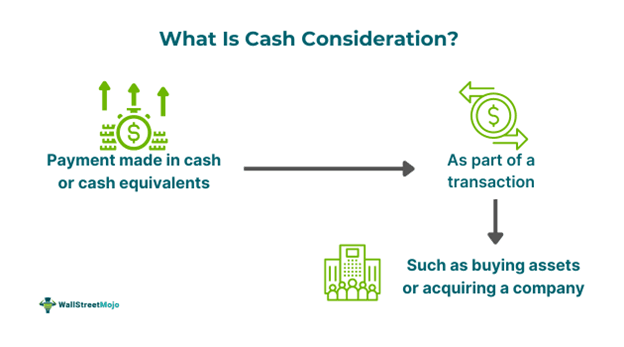Table Of Contents
What Is Cash Consideration?
Cash consideration is a mode of payment made in cash as part of a deal or transaction. It is the actual monetary worth paid or received in return for products, services, assets, or payment in a commercial transaction.

Money is a common method of payment in various business transactions, including mergers and acquisitions, sales of assets, compensation packages, and contractual agreements. It is often discussed in mergers and acquisitions because it provides liquidity and immediate value on the large exchange compared to its other alternatives.
Key Takeaways
- Cash consideration is a method of payment in a deal or transaction where the payment is made entirely in cash.
- In a merger where the entire consideration is cash, the transaction's monetary value remains constant from the time of announcement to its completion.
- Compared to non-monetary considerations like stocks or assets, cash consideration carries a lower risk of value fluctuation, making it generally perceived as more secure and reliable.
- Alternatives to cash consideration include stock consideration, a mix of cash and non-cash payments, and debt-based payments.
Cash Consideration Explained
Cash considerations are payments made in the form of money or cash as part of a transaction. It is a direct transfer of funds from one party to another to perform a duty or finish a financial transaction. The whole consideration for the merger is cash, and from the time it was announced until it was completed, the combination's monetary value remained constant.
In acquisitions and mergers, the company may buy most of the target business's shares in corporate acquisitions in an all-cash transaction. The target company's shareholders cannot purchase the acquiring company's stock in such a deal. Cash may be obtained via the acquirer's balance sheet, debt issue, secondary equity issuance, or the issuance of other such securities.
Cash is the most straightforward mode of exchange for products, services, or other assets because it is widely accepted as payment. It eliminates the need for additional processes, such as selling or converting non-cash assets, because it provides instant liquidity.
Therefore, it can be utilized for many different reasons and is more flexible. Additionally, it carries a lesser risk of value fluctuation when compared to non-monetary considerations like stocks or assets. The perception is that paying in cash is more secure and reliable. However, depending on the jurisdiction and circumstances, receiving cash as payment could have tax implications.
Examples
Let's understand the concept with the help of some hypothetical and real-world examples.
Example #1
Let's take the hypothetical example of Dan, a business owner. His company, "ABC Ltd., is planning to go ahead with a merger and acquisition. He chose cash consideration. Cash consideration might benefit a business owner like Dan in several ways. First of all, it offers liquidity and instant value. Dan can utilize the money obtained to cover his immediate financial responsibilities, put it toward other projects, or put it back into his own company. Because cash is widely accepted and easily converted into other assets or investments, it offers simplicity and convenience. Additionally, valuing a transaction in terms of cash consideration can be simple and transparent, making it simpler to determine the worth and significance of the transaction.
Example #2
In June 2016, LinkedIn, the world's largest professional network, and Microsoft Corp., an American multinational technology company, entered into an acquisition agreement. Microsoft agreed to purchase LinkedIn for $196 per share in an all-cash transaction valued at $26.2 billion. The boards of directors of both LinkedIn and Microsoft unanimously approved the deal. Microsoft planned to finance the transaction primarily through the issuance of new debt. Following the acquisition, LinkedIn was expected to maintain its distinct brand, culture, and independence.
Limitations
Some of the limitations of cash considerations are as follows:
- Compared to other kinds of consideration, such as stock or non-cash assets, cash consideration may have a lower chance of being negotiated into a deal.
- Cash consideration may be subject to less advantageous tax treatment than other kinds of consideration, such as stock or property, which have favorable tax treatments.
- In circumstances where cash is the main factor, the accessibility of sufficient cash flow or financing could restrict the capacity to complete the deal.
Alternatives
Some of the alternatives to consideration in cash are as follows:
- Stock consideration: As an alternative to cash, the purchasing firm may give its shares as payment, giving the target Company shareholders a stake in the new company.
- Combination of cash and non-cash consideration: The consideration, or the amount that the buyer pays for the target business, maybe solely cash or include a mix of cash and securities like common stock, preferred stock, or subordinated promissory notes. A combination of cash and non-monetary compensation can provide flexibility and achieve the parties' interests in the transaction.
- Debt-based payment: The finance structure for a merger or acquisition deal may include debt, depending on the acquirer's choice. The sellers gain from debt financing since they will only have to pay taxes once the debt installments have been made. Usually, the seller must verify that the buyer is in sound financial standing and will only file for bankruptcy after agreeing to a structure that involves debt.
